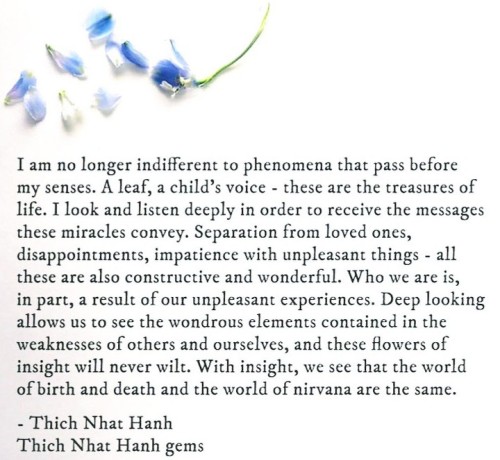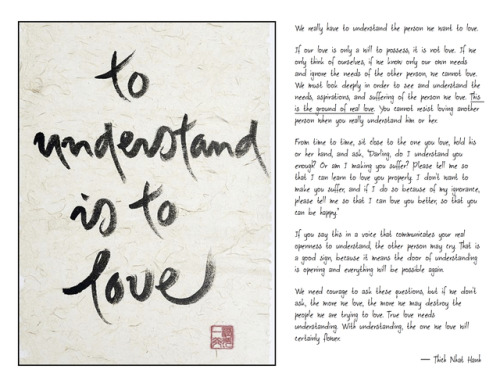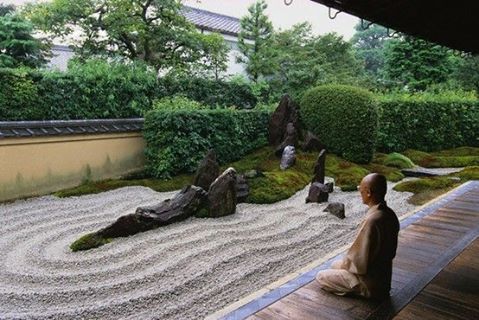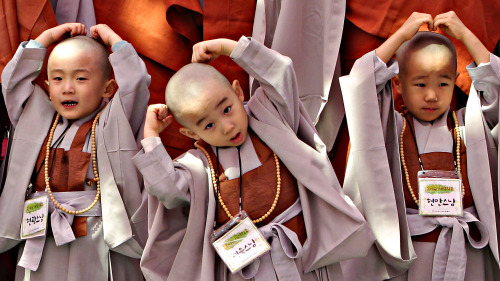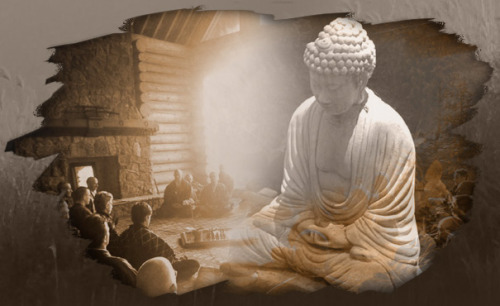#zen buddhism
A Short Philosophical Aside
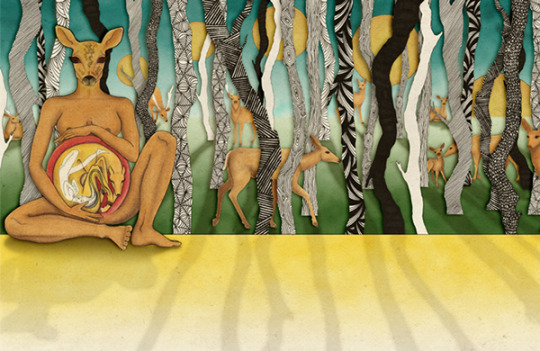
The scrupulous 3-dimension world we humans inhabit is in fact biological, not physical, in origin. Its limitations are determined by our specific sensory, motor and mental apparatus and abilities. It only hints at the real world, and while doing so it combines some highly erroneous observations as well. Molluscs and insects and arachnids all have a very different perspective of their environment. We would find discomfort in the world view of an octopus, as we do in the quantum world view.[1][2]
Dimension is a term laymen toss about haphazardly. Mathematicians and physicists have a more precise interpretation concerning dimension. For them, any independent parameter constitutes a separate dimension. But when it comes down to the nitty-gritty, what if anything can truly be separate and independent? Those are both relative terms. Nothing that exists is really fully isolate and independent. That is one of the substratal premises from which mandalic geometry evolves: relationships invariably exist. And relationships can always change. Mandalic geometry therefore is a geometry of process - a spacetime geometry, not one of space alone.
For those who created the primal I Ching relationship was considered a fundamental aspect of reality. When they thought of dimension - - - and they did, in their own way - - - relationships were always involved. Flash-forward a few thousand years - quantum mechanics accomplishes much the same with its view of interacting particles in continual motion, ever-changing, and incessantly forging transient effective links with numerous other particles of similar and different type under the influence of various fields of force.
Kant thought that human concepts and categories determine our view of the world and its laws. He held that inborn features of our minds structure our experiences. Since, in his view, mind shapes and structures experience, at some level of representation all human experience shares certain essential operational features. Among these according to Kant are our concepts relating to space and time, integral to all human experience. The same might be said about our concepts of cause and effect.
Kant further asserts that we never have direct experience of things, referred to in his writings as the noumenal world. All we experience is the phenomenal world that is relayed to us by our senses. Kant views noumena as the thing-in-itself or true reality and phenomena as our experience or perception of that thing, filtered through our senses and reasoning. According to Kant science can be applied only to things that can be observed and studied. The entire world of noumena is beyond the scope and reach of science. As an heir to Enlightenment philosophy Kant respects the value of reason but believes the noumenal world to be beyond its scope and reach. So are we fated then never to experience the noumena directly? Not by a long shot. Kant claims the noumena to be accessible but only by intellectual intuition without the aid of reason.[3]
In the world of phenomena nothing is self-existent. Everything exists by virtue of dependence on something else. Point to something, anything at all, that refutes that view and I’ll tell you you’re out of your mind - and in the noumenal world. What, pray tell, are you doing there and how did you get there anyway? If you can clearly communicate the how I may give it a try myself.[4]
Image:
One of a set of illustrations by Emma V. MooretitledNoumena - Collages © Emma V Moore 2013 courtesy of the artist. More of her exceptional art can be found at http://www.emmavmoore.co.uk. Follow also on Bēhance Please do not remove credits.
Notes
[1] The world view granted us by our inherited biologic capacities has been millions of years in the making. Indeed. But that makes it still not a whit truer than had we groped it only yesterday. Evolution seems to have sacrificed a full immersive sense of reality to grant a greater degree of interoperability essential to dealing with vicissitudes of a material world and confer durability within that domain. The quest after true apprehension we feel impelled to pursue is a siren not without danger.
“The search for reality is the most dangerous of all undertakings, for it destroys the world in which you live.”
-Nisargadatta Maharaj
[2] Regarding the origin and transformations of the word “scrupulous”:
Scrupulous and its close relative “scruple” (“an ethical consideration”) come from the Latin noun scrupulus, the diminutive of “scrupus.” “Scrupus” refers to a sharp stone, so scrupulus means “small sharp stone.” “Scrupus” retained its literal meaning but eventually also came to be used with the metaphorical meaning “a source of anxiety or uneasiness,” the way a sharp pebble in one’s shoe would be a source of pain. When the adjective “scrupulous” entered the language in the 15th century, it meant “principled.” Now it also commonly means "painstaking" or “careful.” [Source]
Sad to say, this fascinating word that so successfully wended its way through several related incarnations in a number of different Indo-European languages prior to its appearance in English, c.15th century, appears to be passing out of usage among English speakers in modern times. We will likely be left with the occasional utterance of “scruples” but “scrupulous” itself seems destined for oblivion.
Curiously, my election of the word here was not rationally motivated. As I was framing the thought expressed in the paragraph in my mind, the word just appeared out of nowhere and seemed to insist, “I belong here though you may not yet understand why. You really need a word with my complex heritage of multiple meanings here.” And so I went with it, not fully knowing why. Funny thing about it, my rational mind is quite unable now to come up with any other single word that suits as well.
[3] Kant’s epistemology recognizes three different sources of knowlege: sensory experience, reason, and intuition. He views intuition as independent of the other two and the only one of the three with direct access to the world of noumena. This may present as suspect at first, but then how do we explain things like what Einstein did a century ago? Einstein himself has hinted in his writings at the essential role of intuition and imagination in his thinking.
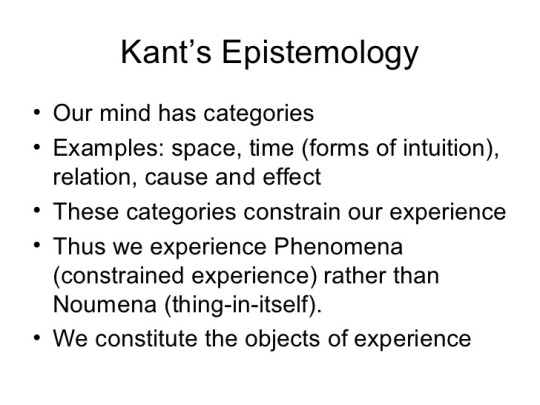
Clickhere for more slides on Kant’s philosophy by William Parkhurst from Introduction to Philosophy Lecture 13, source of the above slide reproduction.
[4] Our human penchant for categorization inevitably leads to dismemberment of holistic reality into an endless number of manifest objects, many of which we no longer recognize as essentially related.
“People normally cut reality into compartments, and so are unable to see the interdependence of all phenomena. To see one in all and all in one is to break through the great barrier which narrows one’s perception of reality.”
-Thích Nhất Hạnh
© 2016 Martin Hauser
Please note: The content and/or format of this post may not be in finalized form. Reblog as a TEXT post will contain this caveat alerting readers to refer to the current version in the source blog. A LINK post will itself do the same. :)
Scroll to bottom for links to Previous / Next pages (if existent). This blog builds on what came before so the best way to follow it is chronologically. Tumblr doesn’t make that easy to do. Since the most recent page is reckoned as Page 1 the number of the actual Page 1 continually changes as new posts are added. To determine the number currently needed to locate Page 1 go to the most recent post which is here. The current total number of pages in the blog will be found at the bottom. The true Page 1 can be reached by changing the web address mandalicgeometry.tumblr.com to mandalicgeometry.tumblr.com/page/x, exchanging my current page number for x and entering. To find a different true page(p) subtract p from x+1 to get the number(n) to use. Place n in the URL instead of x (mandalicgeometry.tumblr.com/page/n) where
n = x + 1 - p. :)
-Page 305-
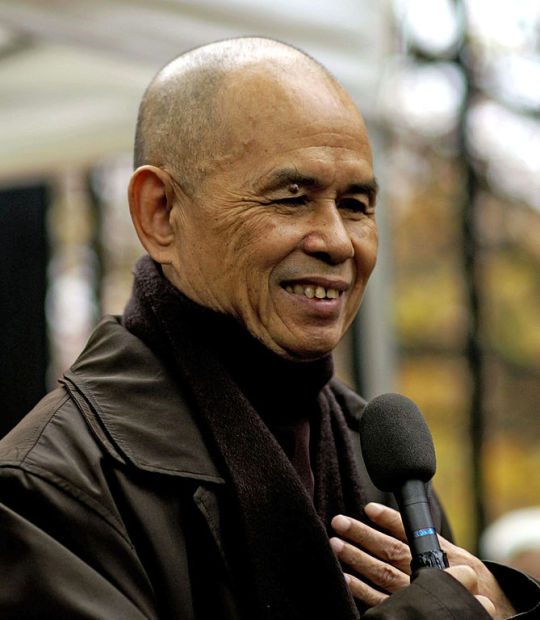
The beloved teacher, civil rights activist, and pioneer of engaged Buddhism died on January 22 at midnight (ICT) at his root temple, Tu Hieu Temple, in Hue, Vietnam. He was 95. Hanh suffered from a severe brain hemorrhage in 2014, which left him unable to speak, and had been living at Tu Hieu Temple. After the Plum Village Community, Hanh’s sangha, announced his passing, followers, dharma teachers, and world leaders, including the Dalai Lama, immediately started sharing remembrances and condolences.
Nhat Hanh entered a Buddhist monastery at age 16, devoting his life to the faith. He became a teacher, first leaving Vietnam in 1961 to serve as a guest lecturer at Princeton University and Columbia University. Nhat Hanh returned to Vietnam in 1963 to work toward peace during the long and violent war that raged in his homeland, bringing aid to the people and urging North and South Vietnam to work together to end the war. When Nhat Hanh left Vietnam again in 1966 to tour the world calling for peace, his home country banned him from returning.
Exiled from Vietnam, Nhat Hanh became a powerful symbol of peace, nominated by Dr. Martin Luther King. Jr. for the Nobel Peace Prize in 1967. He established the Plum Village Monastery in southwest France and began spreading his teachings throughout the West. Nhat Hanh wrote dozens of books guiding readers toward peace and mindfulness, and he made Buddhism accessible by suggesting that inner peace can be achieved through living an ordinary life with awareness of things like breath and joy. It was the beginning of the mindfulness movement, and Nhat Hanh attracted Western followers who were less interested in traditional Western religion but loved the spirituality they found in his teachings. Mindfulness grew to become a popular 21st century practice. Nhat Hanh became known as Thay, Vietnamese for teacher.
Nhat Hanh first returned to Vietnam in 2005, almost 40 years since his exile began. He traveled the country and published several of his books in Vietnamese, though he received criticism for not speaking out against religious oppression in the country. Nhat Hanh returned for another tour in 2007. In 2018, after suffering a stroke in 2014 that left him unable to speak, Nhat Hanh went to Vietnam a final time, with the intention of living his final days at Tu Hieu Temple, where he first took his vows.
Photo by Duc Truong.
Are thought and experience philosophically compatible?
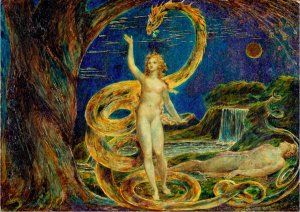
The assertion on trial in this paper is the idea that metaphysics and existentialism are as incompatible as they are often considered to be. First, we shall define both metaphysics and existentialism. Purely for convenience, I borrow the two definitions entirely. Most readers will understand these two terms readily, but they set a useful foundation for the discussion. “Metaphysics is a branch of…
[image: scattered pale blue petals next to a small, vivid blue flower. Below is a quote. “I am no longer indifferent to phenomena that pass before my senses. A leaf, a child’s voice - these are the treasures of life. I look and listen deeply in order to receive the messages these miracles convey. Separation from loved ones, disappointments, impatience with unpleasant things - all these are also constructive and wonderful. Who we are is, in part, a result of our unpleasant experiences. Deep looking allows us to see the wondrous elements contained in the weaknesses of others and ourselves, and these flowers of insight will never wilt. With insight, we see that the world of birth and death and the world of nirvana are the same.” - Thich Nhat Hanh]
Post link
Azula and Buddhism
I recently saw on ask directed at @chaoticsandstorm (who posts awesome stuff btw) about whether Azula could become a Buddhist. I want to give my thoughts on that since those two topics are my main interests and preoccupations.
Firstly yes, the Air Nomads seem to be the only explicitly Buddhist culture in the show but Tibetan Buddhism isn’t the only form of that religion that exists in our world so it’s possible that other forms exist in the Avatar world. I don’t consider the Tibetan tradition heretical or unorthodox but I will hone in on the tradition I personally study and follow, which is Zen. I will presume some familiarity on the reader’s part with Buddhism overall as I continue.
Firstly I will say that I genuinely believe and feel justified in thinking that religion and spirituality are some of the most powerful tools ever created for influencing human thought and behavior for good or for ill and I think the concept is underutilized or ignored in the vast majority of Azula stories I’ve encountered.
Firstly, why would Azula even consider a different philosophy from the one she was raised with? I’d say it’s a mixture of desperation and pragmatism. She’s shown capable of appreciating the talents of non benders and the strength of earth benders. As a fugitive in the Earth Kingdom or the Colonies she might encounter a temple or monastery and use the charity traditionally provided to wanderers for a night, learn a little what it is about and decide to try their brand of meditation just to see what happens, she has nothing to lose.
The thing about Zen meditation when properly instructed is that it provides a small yet very tangible feeling of peace and comfort very early on, something Azula hasn’t experienced in a very long time at that point and something she’ll likely come to crave very quickly. So, she stays to figure out just enough to deal effectively with the turmoil in her head.
This would be her first lesson and goal, to realize that all the stuff going in her head and heart no matter how upsetting and horrible cannot last forever, that it’s transitory and impermanent and that there’s something deeper inside her that cannot be destroyed or disturbed so easily, something that is GOOD.
This something is usually called Buddha nature or original enlightenment and all beings posses it. That’s the key part, her redemption and healing wouldn’t be about destroying who she is but realizing there’s more to her than she thought. It’s about her genuinely and first hand experiencing that she was and is capable of being more than a monster. In her initial meditation practice she would learn to neither suppress her feelings nor let them control her, not to condemn herself for feeling what she feels nor abandon the desire to overcome them. Being aware of your thoughts and emotions in a truly attentive way for long enough does lessen the power they have over oneself. Over time you learn an important trick when it comes to resisting your bad tendencies and impulses, instead of letting the pain of denial torture you you learn to take pleasure and delight in the act of resisting temptation which I can see Azula taking great pride in.
Now that she can better resist doing what she should not do there arises the question what she SHOULD do. Fortunately monasteries have thought of that. Azula is a person who works well in an environment of structure, discipline and clear hierarchy, something Zen monasteries emphasize. Clear codes of conduct exist even down to detailed explanations on why something is good or bad. More importantly, if the rules are broken there are clear procedures on what has to be done to be forgiven. Moreover, Zen ritual and prayer is designed to help students internalize both the desired behaviors and the mental attitude that goes with it. Being a good person is a teachable skill and not something nebulous and ineffable and I feel such an assurance and blueprint would be a great blessing for Azula. Plus being in a community full of people who want to be the best they can be would positively kindle her competitive instincts. Also Zen teachers do not shower students with flowery praise, a nod of the head of a respected master feels greater than all poetry in the world.
Now, the goal of Zen isn’t to give you the chance to feel high all the time, that’s not what enlightenment is. It’s about realizing that your normal conscience is perfectly ok, you don’t need to feel one with the universe at all times, that you’re not defective for being human. The sense of peace one feels eventually isn’t as sparkly as what we usually think of as happiness but it’s way more effective, beneficial and sustainable. It can be described as a state where you neither feel craving, nor repulsion nor indifference. At glance it seems paradoxical but life and reality are paradoxical and the goal of Zen is to help you deal with it successfully. Which leads to the next aspect, the intellectual.
Many may be familiar with the concept of koans, sayings or questions that are designed to break you out of standard patterns of thinking and let you see reality in a new way. They actually tend to work better and have more effect on people who are very good at being very logical. If presented with such a challenge Azula likely wouldn’t give up until she found a solution that would impress her teacher. Yes, she’d totally try to be the teacher’s pet xD Though, Zen is firmly based on the treatises of ancient Indian masters but in practice they are often condensed into proverbs. Knowing Azula’s distaste for vaguely wise sayings she’d insist on reading the full long texts, memorize them fully and come up with her own summaries.
Also there IS something very fire bender about Zen, it values and often requires absolute and fierce dedication. One of the standard prayer chants is basically a creed of badass:
My flaws are endless, I swear to fix them all. The suffering of beings is endless, I swear to help them all. The teachings are immeasurable, I swear to learn them all. The way of Buddha is unsurpassable, I swear to walk it to the end.
Also I want to add that despite some unfortunate history of sexism women still are considered capable of full and complete enlightenment, there’s veneration of women who achieved that state and texts that firmly reject that women cannot achieve the ultimate goal.
There is more I can add and talk about but I might save it for another time. I do not however claim to be an absolute authority on Zen. I’m merely an Eastern European who feels greatly indebted to what little I know about Zen for it definitely and tangibly changed my life for the better and is still improving it.
Hope my pet idea of Azula becoming a Zen practicioner was entertaining to read.
I’ve been working through Thich Nhat Hanh’s amazing book, Peace Is Every Step. This particular quote resonated with me so strongly that I decided to make it into an image, so I can put it on my fridge as a reminder. And then I decided to share it with y’all. You can download it as a PDF to print here.
Transcript of image:
We really have to understand the person we want to love.
If our love is only a will to possess, it is not love. If we only think of ourselves, if we know only our own needs and ignore the needs of the other person, we cannot love. We must look deeply in order to see and understand the needs, aspirations, and suffering of the person we love. This is the ground of real love. You cannot resist loving another person when you really understand him or her.
From time to time, sit close to the one you love, hold his or her hand, and ask, “Darling, do I understand you enough? Or am I making you suffer? Please tell me so that I can learn to love you properly. I don’t want to make you suffer, and if I do so because of my ignorance, please tell me so that I can love you better, so that you can be happy.”
If you say this in a voice that communicates your real openness to understand, the other person may cry. That is a good sign, because it means the door of understanding is opening and everything will be possible again.
We need courage to ask these questions, but if we don’t ask, the more we love, the more we may destroy the people we are trying to love. True love needs understanding. With understanding, the one we love will certainly flower.
— Thich Nhat Hanh
Post link
Tomiyuki Kaneko—Apotropaic Daruma (transparent watercolor, pen, foil on Shirakawa Daruma, 2021)
Post link
Empty yourself of everything. Let the mind become still. The ten thousand things rise and fall while the Self watches their return. They grow and flourish and then return to the Source. Returning to the Source is stillness, which is the way of Nature.
~Laozi
Tao Te Ching, Verse 16
(Source: Tao & Zen Facebook Page)
Post link
Three Teachings refers to Confucianism,Taoism, and Buddhism when considered as a harmonious aggregate.
Confucianism
Confucianism is a complex school of thought, sometimes also referred to as a religion, revolving around the principles of the Chinese philosopher Kong Zi (westernized: Confucius). It was developed in the Spring and Autumn Period during the Zhou Dynasty. Main concepts of this philosophy include Ru (humaneness), righteousness, propriety/etiquette, loyalty, and filial piety, along with a strict adherence to social roles. This is illustrated through the five main relationships Confucius interpreted to be the core of society: ruler-subject, father-son, husband-wife, elder brother-younger brother, and friend-friend. In these bonds, the latter must pay respect to and serve the former, while the former is bound to care for the latter.
The following quotation is from the Analects, a compilation of Confucius’ sayings and teachings, written after his death by his disciples. “The superior man has a dignified ease without pride. The mean man has pride without a dignified ease.” ― Confucius, The Analects of Confucius
This quotation exemplifies Confucius’ idea of the junzi (Chinese: 君子) or gentleman. Originally this expression referred to “the son of a ruler”, but Confucius redefined this concept to mean behavior (in terms of ethics and values such as loyalty and righteousness) instead of mere social status.[3]
Taoism
Taoism, or Daoism, is a philosophy centered on the belief that life is normally happy, but should be lived with balance and virtue. Its origin can be traced back to the late 4th century B.C and the main thinkers representative of this teaching are LaoziandZhuangzi. Key components of Daoism are Dao (the Way) and immortality, along with a stress on balance found throughout nature. There is less emphasis on extremes and instead focuses on the interdependence between things. For example, the yin/yang symbol does not exemplify good or evil. It shows that there are two sides to everything -“Within the Yang there exists the Yin and vice versa.”
The basis of Taoist philosophy is the idea of “wu wei”, often translated as “not doing”. But, in practice, it refers to an in-between state of “not doing” and “being, but not acting”. This concept also overlaps with an idea in Confucianism as Confucius similarly believed that a perfect sage could rule without taking action. Two other assumptions in the Taoist system are 1) any extreme action can initiate a counteraction of equal extremity and 2) excessive government can become tyrannical and unjust, even government created with good intentions.
The following is a quote from the Dao De Jing, one of the main texts in Daoist teachings. “The truth is not always beautiful, nor beautiful words the truth.” ― Lao Tzu, Tao Te Ching (Dao De Jing)
Buddhism
Buddhism is a religion that is based on the teachings of Siddhartha Gautama. The main principles of this belief system are karma, reincarnation, and impermanence. Buddhists believe that life is full of suffering, but that suffering can be overcome by attaining enlightenment. Nirvana (a state of perfect happiness) can be obtained by breaking away from (material) attachments and purifying the mind. However, different doctrines vary on the practices and paths followed in order to do so. Meditation serves as a significant part in practicing Buddhism. This calming and working of the mind helps Buddhists strive to become more peaceful and positive, while developing wisdom through solving everyday problems. The negative mental states that are sought to be overcome are called “delusions”, while the positive mental states are called “virtuous minds”.Another concept prominent in the Buddhist belief system is the Eight-Fold Path. The Eight-Fold Path is the fourth of the Four Noble Truths, which is said to be the first of all Buddha’s teachings.It stresses areas in life that can be explored and practice, such as right speech and right intention.
Post link
“Knock, And He’ll open the door
Vanish, And He’ll make you shine like the sun
Fall, And He’ll raise you to the heavens
Become nothing, And He’ll turn you into everything.”
Post link
“Through my love for you, I want to express my love for the whole cosmos, the whole of humanity, and all beings. By living with you, I want to learn to love everyone and all species. If I succeed in loving you, I will be able to love everyone and all species on Earth… This is the real message of love.”
― Thich Nhat Hanh
Post link


